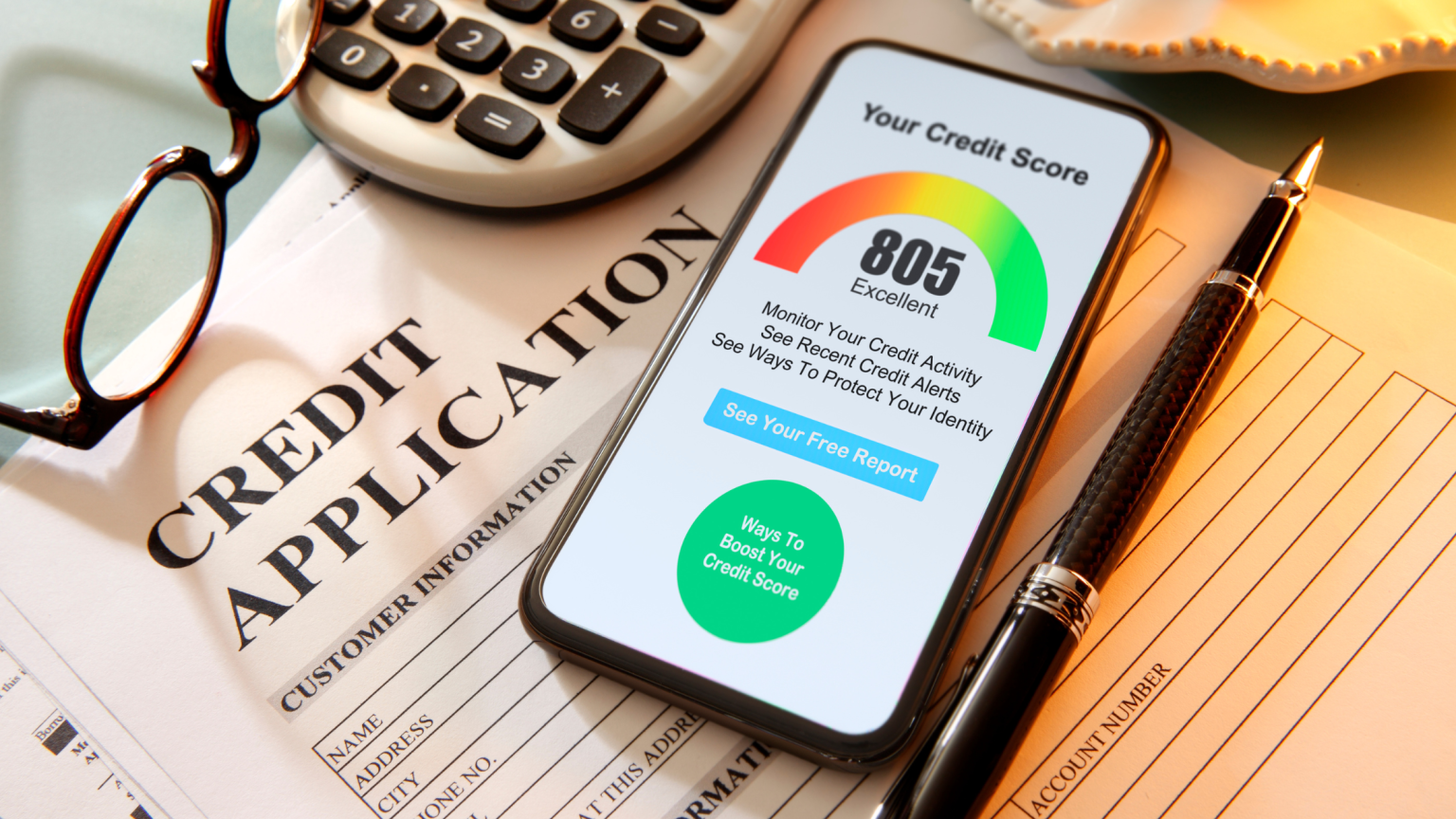In today’s financial landscape, a good credit score is more than just a number—it’s a gateway to achieving personal and financial milestones. Whether you’re applying for a mortgage, seeking a loan for a new car, or hoping to reduce interest rates on your credit cards, your credit score plays a crucial role. But what happens when your credit score is less than stellar?
Fortunately, there are effective ways to repair your credit, and it all starts with understanding your credit reports. This guide will walk you through “How To Fix Your Credit Score In 6 Steps,” offering insight into the processes that can help you navigate the complex world of credit repair. From dissecting your credit reports to strategic financial planning, we’ll explore proven strategies to elevate your credit score and unlock new financial possibilities.

Check Your Credit Score and Credit Reports
The first step in repairing your credit is to know exactly where you stand. This means obtaining your credit reports from the major consumer credit bureaus—Equifax, Experian, and TransUnion. Each year, you’re entitled to one free credit report from each of these bureaus, thanks to the Fair Credit Reporting Act.

Once you have your reports, the next step is checking your credit score. Several credit card issuers and financial institutions offer free credit score access to their customers. Your credit score is a snapshot of your creditworthiness, distilled into a number that lenders use to evaluate your loan and credit applications.
Regularly reviewing your credit reports and scores allows you to understand your current financial standing and identify any inaccuracies or areas for improvement. This proactive approach is essential for anyone looking to repair their credit, as it lays the groundwork for the steps that follow.
Can You Pay to Fix Your Credit Score?
Navigating the realm of credit repair services can be complex. While it’s tempting to believe that paying a credit repair company can quickly fix your credit, the reality requires understanding what these services can legitimately offer. A reputable credit repair company can assist you in disputing inaccuracies on your credit reports, a task you can also undertake yourself for free.
However, they cannot remove legitimate negative information from your reports. The effectiveness of a credit counseling agency lies in its ability to provide personalized advice on managing your debt and improving your credit habits over time. When considering such services, it’s crucial to research thoroughly to avoid scams and ensure the agency is reputable and has a track record of helping individuals improve their financial standing.
Pay Down Any Credit Card Debt You Have
Reducing credit card debt is a critical step towards improving your credit score. High balances, especially when close to your credit limits, can significantly impact your credit utilization ratio—a major factor in credit score calculations. Here are strategies to tackle credit card debt:
- Prioritize Debts: Consider the debt avalanche method, focusing on paying off cards with the highest interest rates first while maintaining minimum payments on others.
- Consolidate Debt: A debt consolidation loan or a balance transfer credit card with a lower interest rate can help manage and reduce your debt more efficiently.
- Budget Adjustments: Reevaluate your spending and budget to allocate more funds towards debt repayment.
- Automatic Payments: Setting up auto-payments can prevent late payments, a key factor in maintaining a healthy credit score.
By addressing your credit card debt head-on, you not only reduce the financial burden but also lay the groundwork for a healthier credit score. Remember, this journey requires patience and persistence, but the positive impact on your financial freedom is well worth the effort.
Check Your Credit Report For Errors
An essential aspect of repairing your credit involves scrutinizing your credit reports for any errors or inaccuracies. Errors can range from incorrect personal information to outdated account statuses. Under the Fair Credit Reporting Act, you have the right to dispute any inaccuracies with the credit bureau. Start by carefully reviewing your credit reports from all three major bureaus for any discrepancies.
If you uncover errors in your credit report, it’s crucial to employ advanced dispute tactics by submitting a detailed dispute letter to the involved bureau(s), complete with supporting evidence for your claim. Credit bureaus are mandated to investigate your dispute within 30 days.
Successfully removing these inaccuracies can have a positive effect on your credit score, ensuring that your credit history is accurately represented. These strategic efforts are fundamental in navigating the complexities of credit reporting and in safeguarding your financial health.
Reduce Your High-Balance Accounts
Your credit utilization ratio — how much credit you’re using compared to your available credit limits — significantly influences your credit scores. High balances on your credit accounts can signal to lenders that you’re over-reliant on credit, potentially making you a riskier borrower. To improve your credit scores, focus on reducing the balances of your high-balance accounts.
Aim to keep your credit utilization below 30% of your total available credit. This can be achieved by paying down existing debt and not accumulating new charges. Lowering your credit utilization not only boosts your credit scores but also improves your overall financial health by reducing the amount of interest you pay over time.
What Happens After a Dispute?
After you’ve submitted a dispute to a credit bureau regarding inaccuracies on your credit report, the bureau initiates an investigation process. This involves the credit bureau contacting the entity that provided the disputed information, usually within 30 days. The information provider then reviews the dispute and reports back to the credit bureau. If the information is found to be inaccurate, it must be corrected or removed from your credit report.
Once the investigation is complete, the credit bureau will provide you with the results and a free copy of your updated credit report if the dispute led to a change. This dispute resolution process is crucial for maintaining the accuracy of your credit report and can positively impact your credit score if erroneous or outdated information is removed.
How Long Does It Take to Rebuild Credit?
Rebuilding credit is a process that doesn’t happen overnight. The timeframe for seeing an improvement in your credit score can vary widely, depending on your individual circumstances and the steps you’re taking to improve your credit health.
Typically, minor improvements can be seen within a few months of adopting better credit habits, such as paying bills on time and reducing balances on credit cards. However, more significant improvements, especially if you’re recovering from major derogatory marks like bankruptcies or foreclosures, can take several years.
Consistently managing credit responsibly, such as by maintaining low credit utilization and making payments on time, is key to gradually improving your credit. Regularly monitoring your credit score can help you track your progress and understand the effectiveness of your credit repair efforts.
Consistent Actions to Build Credit
Building a good credit score is akin to running a marathon, requiring consistent effort and strategic planning over time. By adhering to a few key practices, you can steadily improve your credit health, paving the way for financial opportunities and benefits.
Pay Your Credit Card Balances in Full
One of the most effective actions you can take to build and maintain a high credit score is to pay your credit card balances in full each month. This habit not only helps you avoid costly interest charges but also demonstrates your financial responsibility to lenders. Regular, full payments positively affect your payment history, which is a significant factor in credit score calculations.
Moreover, it keeps your credit utilization ratio low, another crucial element in determining your credit score. By paying off your balances in full, you signal to credit bureaus and lenders that you’re managing your credit wisely, leading to potential improvements in your credit score over time.
Wait for Negative Items to Fall Off Your Credit Reports
Negative information on your credit reports, such as late payments, collections, and bankruptcies, can significantly impact your credit scores. However, most negative items are not permanent and will eventually fall off your reports. For example, late payments can remain on your credit report for up to seven years, while bankruptcies can stay for up to ten years, depending on the type. As negative items age and are removed from your report, you may see a natural improvement in your credit score.
It’s important to continue practicing good credit habits during this time, as positive actions can help offset the impact of past negatives. Understanding the timeline for negative information to be removed can provide a clearer picture of your path to credit recovery and help set realistic expectations for credit score improvement.
Improving Payment History
Payment history is a cornerstone of your credit score, making it imperative to focus on maintaining an impeccable record of on-time payments.

Improve Your Payment History
Making on-time payments is perhaps the most significant action you can take to enhance your credit score. Payment history accounts for a substantial portion of your credit score calculation, reflecting your reliability as a borrower. Late payments and missed payments can severely impact your credit score, signaling to lenders that you might be a higher-risk borrower.
To improve your payment history, set up automatic payments for your bills, or set reminders to ensure you pay on time. Over time, a consistent pattern of timely payments will positively influence your credit score, showcasing your financial responsibility to future lenders.
Dispute Errors on Your Credit Report
Even with diligent financial management, inaccuracies on your credit report can unjustly affect your credit score. Regularly reviewing your credit report for errors — and disputing any inaccuracies found — is critical. This process involves notifying the relevant credit bureau of the mistake and providing any documentation that supports your claim.
Successful disputes that result in the removal of erroneous information can lead to improvements in your credit score. Engaging in this practice not only ensures the accuracy of your credit history but also protects your credit score from the negative impacts of mistakes you didn’t make.
Considerations for New Credit
When looking to build or improve your credit score, how you manage new credit applications and understand your credit utilization ratio are vital.
Apply for New Credit Sparingly
Each time you apply for new credit, a hard inquiry is made on your credit report, which can temporarily lower your credit score. Therefore, it’s wise to apply for new credit only as needed. Too many hard inquiries in a short period can signal to lenders that you’re taking on too much debt too quickly, potentially increasing your risk as a borrower.
Thoughtfully consider your need for new credit and research the best options before applying to minimize the impact on your credit score.
Know Your Credit Utilization Ratio
Your credit utilization ratio — the amount of credit you’re using compared to your total available credit — is another critical factor in credit score calculations. High utilization can indicate that you’re overly reliant on credit, negatively affecting your score. It’s recommended to keep your credit utilization below 30%.
Managing this ratio can involve paying down existing balances and being mindful of new charges. In some cases, obtaining a secured credit card and using it responsibly can also help manage and improve your credit utilization, contributing positively to your credit score over time.
Addressing Credit Balance Myths
A common myth surrounding credit cards is that carrying a balance from month to month will positively affect your credit score. In reality, maintaining a balance often results in unnecessary interest charges without providing any real benefit to your credit health. Lenders and credit bureaus are more interested in your ability to pay off your debt rather than in you accruing it. Paying your balance in full each month demonstrates financial responsibility and can actually improve your credit score over time by keeping your credit utilization low. This practice is both financially savvy and beneficial for your credit standing.
Using Credit Repair Services
Pros and Cons of Credit Repair Services
Credit repair services can offer guidance and take action on your behalf to dispute inaccuracies on your credit report.
Pros include the convenience of having an expert handle disputes and potentially identifying errors you might overlook. These services can also navigate the complexities of credit law more effectively.
However, cons involve costs, as reputable credit repair services charge fees for their work. Additionally, some companies make unrealistic promises about quick fixes for your credit score, which can be misleading.
Importance of Choosing Reputable Services
Selecting a reputable credit counseling agency or credit repair service is crucial. Look for agencies with certifications and positive reviews from trusted sources. Reputable services should provide a clear understanding of what they can and cannot do for your credit, including a realistic timeframe for results. They should also offer initial consultations without high upfront fees. By choosing wisely, you can avoid scams and work with a service that genuinely aims to improve your credit situation.
Avoiding Scams and Seeking Help
The path to repairing your credit is fraught with potential scams, targeting individuals eager to improve their credit scores quickly. The Federal Trade Commission warns against companies that promise instant credit repair, charge upfront fees before providing any services, or suggest disputing accurate information on your credit reports.
To avoid falling victim to such scams, research any credit repair service thoroughly. Look for reviews, complaints, and any actions taken by regulatory bodies.
When seeking reputable help, consider accredited non-profit credit counseling agencies that offer a range of services, from budget counseling to debt management plans, often at a low cost. These agencies can provide valuable guidance and support as you work to repair your credit.
Ensure that any service you choose is transparent about the process, costs, and expected outcomes. Remember, repairing credit takes time and there are no shortcuts.
Conclusion
Improving and maintaining a good credit score requires patience, persistence, and the adoption of sound financial practices. There are no quick fixes when it comes to credit repair, but by following the steps outlined—such as regularly checking your credit reports for errors, managing your debt wisely, and understanding your credit utilization—you can gradually improve your credit score.
It’s also crucial to be aware of the potential pitfalls, such as credit repair scams, and to choose reputable help when needed. Your journey to a better credit score is a marathon, not a sprint. With the right strategies and a commitment to responsible credit use, you can achieve and maintain good credit, opening up new opportunities for your financial future.
